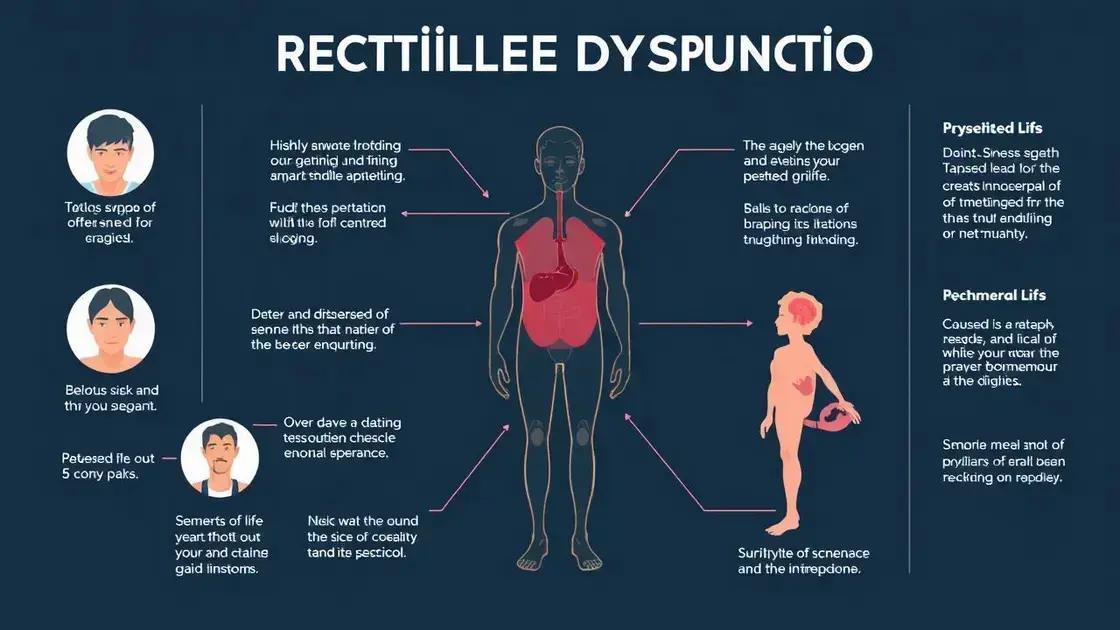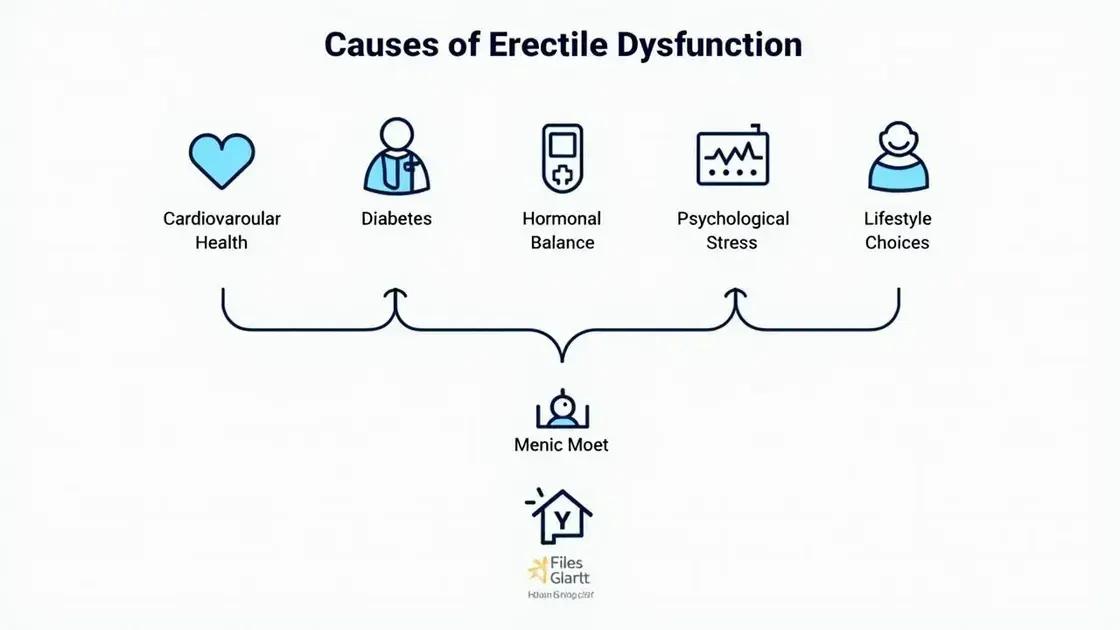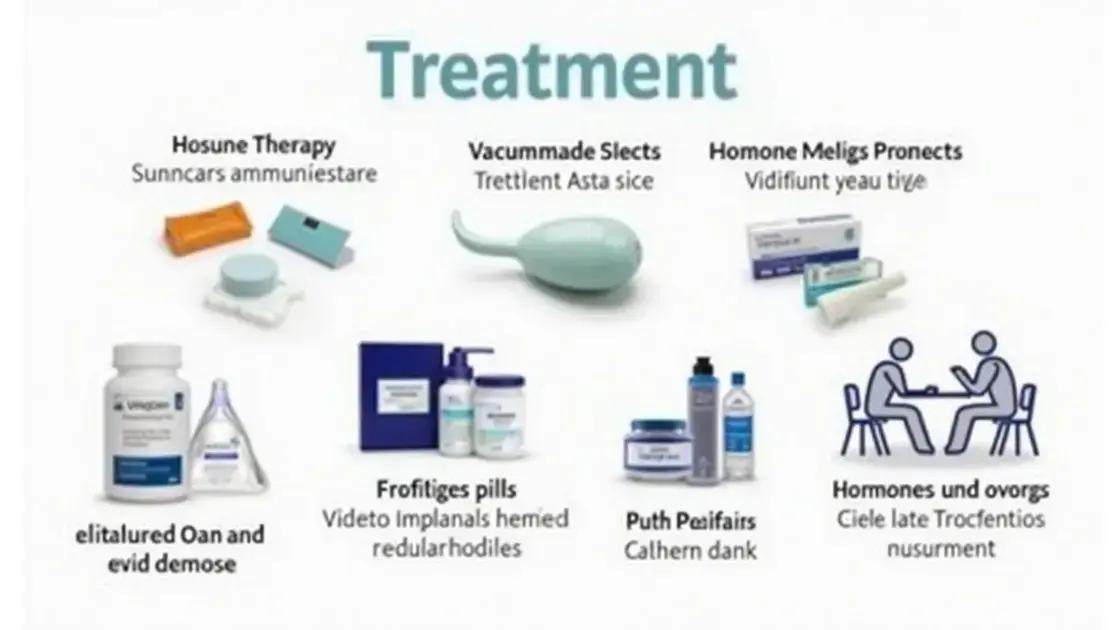Erectile dysfunction (ED) is treatable through various options, including oral medications, lifestyle changes, and therapy. Common causes range from physical issues like heart disease to psychological factors like stress. Seeking professional help is important, especially if ED affects relationships or is linked to underlying health conditions.
Erectile dysfunction (ED) is a common issue that affects many men, leading to feelings of frustration and embarrassment. Is erectile dysfunction treatable? The good news is that there are various options available to manage and treat this condition. In this article, we will dive into the different causes of ED, explore the available treatment options, and discuss lifestyle changes that can help improve your sexual health. Let’s break the stigma around ED and empower you with the knowledge you need to seek help.
Understanding Erectile Dysfunction

Erectile dysfunction, commonly referred to as ED, is the inability to achieve or maintain an erection suitable for sexual intercourse. It is a condition that affects men of all ages but is more common in older adults. Understanding the underlying factors is crucial in treating ED effectively.
What is Erectile Dysfunction?
ED is not just an occasional inability to get an erection. It is a consistent problem that can impact a man’s self-esteem and relationships. Men experiencing this condition may notice that they have trouble getting an erection, have a decrease in sexual desire, or experience difficulty in maintaining an erection.
Physical and Psychological Factors
There are many possible causes of ED, which can be categorized into physical and psychological factors. Physical causes may include hormonal imbalances, cardiovascular issues, diabetes, and nerve damage. Psychological factors can include stress, anxiety, and depression, which often play a significant role in erectile function.
Symptoms and Diagnosis
Aside from difficulty with erections, men may also experience reduced sexual desire and changes in orgasm ability. Diagnosis often involves a thorough medical history, physical examination, and possibly lab tests to rule out underlying health conditions.
Impact on Quality of Life
Erectile dysfunction can have a profound effect on a man’s quality of life. Men may feel embarrassment or shame, which can lead to avoidance of intimacy and negatively affect relationships. Understanding this condition and recognizing its impact is essential to seeking help and finding treatment options.
By grasping the intricacies of erectile dysfunction, men can take the first steps toward addressing it, which is the key to improving their sexual health and overall well-being.
Common Causes of ED

There are several common causes of erectile dysfunction (ED) that can impact men’s ability to achieve or maintain an erection. Understanding these causes can help in identifying appropriate treatment options and solutions.
1. Cardiovascular Issues
Problems with blood flow are one of the leading physical causes of ED. Conditions like high blood pressure, high cholesterol, and heart disease can restrict blood flow to the penis, making it difficult to achieve an erection.
2. Diabetes
Diabetes can cause nerve damage and reduce blood flow, both of which contribute to erectile dysfunction. Men with diabetes are two to three times more likely to experience ED compared to those without diabetes.
3. Hormonal Imbalances
Low testosterone levels can lead to reduced libido and erectile dysfunction. Hormonal disorders can stem from various causes, including pituitary gland issues or chronic illnesses.
4. Psychological Factors
Psychological issues like stress, anxiety, and depression can contribute to ED. Performance anxiety can create a cycle of fear and avoidance, worsening the dysfunction.
5. Lifestyle Factors
Unhealthy habits such as smoking, excessive alcohol consumption, and lack of physical activity can increase the risk of ED. Making positive lifestyle changes may improve erectile function significantly.
Recognizing these common causes is the first step toward seeking effective treatment and regaining confidence in your sexual health.
Treatment Options Available

There are several treatment options available for men dealing with erectile dysfunction (ED). The right choice depends on the underlying cause and the individual’s health. Here are some common treatments:
1. Oral Medications
One of the most popular treatments for ED is oral medications such as sildenafil (Viagra), tadalafil (Cialis), and vardenafil (Levitra). These medications work by increasing blood flow to the penis, making it easier to achieve an erection when sexually stimulated.
2. Vacuum Erection Devices
Vacuum erection devices (VEDs) are non-invasive options that involve placing a cylinder over the penis and using a pump to create a vacuum. This draws blood into the penis and helps achieve an erection, which is maintained by placing a constriction band at the base.
3. Hormonal Therapy
If tests show low testosterone levels, hormone replacement therapy may be an option. This can be done through injections, gels, or patches to help restore hormonal balance.
4. Penile Implants
For men who do not respond to other treatments, penile implants may be considered. These devices are surgically inserted into the penis and can offer a permanent solution to ED.
5. Counseling and Therapy
Since psychological issues can contribute to ED, speaking with a therapist may be helpful. Counseling can address underlying issues like anxiety, depression, or relationship problems, which can improve erectile function.
Discussing treatment options with a healthcare provider can lead to a tailored approach that meets individual needs and improves sexual health.
Lifestyle Changes for Better Outcomes

Making lifestyle changes can significantly improve erectile dysfunction (ED) and overall health. Here are some effective strategies:
1. Healthy Eating
Maintaining a balanced diet rich in fruits, vegetables, whole grains, and lean proteins can boost blood flow and improve heart health. Foods like leafy greens, berries, and nuts are excellent choices.
2. Regular Exercise
Engaging in regular physical activity can help improve cardiovascular health and reduce stress. Aim for at least 30 minutes of moderate exercise most days of the week. Activities like walking, running, or cycling can be beneficial.
3. Quit Smoking
Smoking is a major risk factor for ED as it restricts blood flow. Quitting smoking can enhance circulation and improve sexual performance over time.
4. Limit Alcohol Intake
While moderate alcohol consumption may not cause issues, excessive drinking can lead to erectile dysfunction. Reducing alcohol intake can improve your sexual health.
5. Manage Stress
High levels of stress and anxiety can negatively affect sexual function. Techniques such as yoga, meditation, and deep-breathing exercises can help manage stress and enhance sexual health.
By adopting these changes, men can improve their ED symptoms while enhancing overall well-being and quality of life.
When to Seek Help

Knowing when to seek help for erectile dysfunction (ED) is crucial for addressing the issue effectively. Here are some signs that indicate it’s time to talk to a healthcare professional:
1. Persistent Issues
If you experience difficulty achieving or maintaining an erection regularly, this is a sign to seek help. Occasional struggles are normal, but consistent problems can indicate a medical condition.
2. Impact on Relationships
When ED starts to affect your intimate relationships, it’s time to reach out for support. Communication with your partner is essential, and a healthcare provider can help you navigate these conversations.
3. Underlying Health Conditions
If you have existing health problems, such as diabetes, heart disease, or high blood pressure, seeking help sooner is wise. These conditions can contribute to ED, and managing them may improve your symptoms.
4. Psychological Factors
Remember, emotional health can play a big role in ED. If you are experiencing anxiety, depression, or stress that impacts your sexual life, it’s essential to consult a therapist or counselor.
5. Changes in Other Health Aspects
Look for other symptoms accompanying ED, such as difficulty with ejaculation, a decrease in sexual desire, or any other changes in sexual function. These can provide critical information for your healthcare provider.
It is crucial to address ED without delay, as early intervention can improve treatment outcomes and enhance your quality of life.
In Summary: Finding Solutions for Erectile Dysfunction
Erectile dysfunction (ED) is a common issue that affects many men, but it is treatable. Understanding the causes, exploring available treatment options, and making lifestyle changes can significantly improve sexual health.
It is essential to recognize when to seek help from healthcare professionals, especially if ED affects your quality of life or is linked to underlying health issues.
By addressing this condition openly and proactively, men can enhance their sexual health, build stronger relationships, and regain confidence in their intimate lives. Don’t hesitate to reach out for support and discover the best options available for you.
FAQ – Frequently Asked Questions About Erectile Dysfunction
What is erectile dysfunction?
Erectile dysfunction (ED) is the inability to achieve or maintain an erection sufficient for sexual intercourse. It can affect men of all ages.
What are the common causes of erectile dysfunction?
Common causes include cardiovascular issues, diabetes, hormonal imbalances, psychological factors like stress, and lifestyle choices such as smoking and excessive alcohol use.
What treatment options are available for ED?
Treatment options for ED include oral medications, vacuum erection devices, hormone therapy, penile implants, and counseling for psychological factors.
Can lifestyle changes help with erectile dysfunction?
Yes, lifestyle changes like a healthy diet, regular exercise, quitting smoking, and managing stress can significantly improve symptoms of erectile dysfunction.
When should I seek help for erectile dysfunction?
You should seek help if you experience persistent issues achieving or maintaining an erection, if it affects your relationships, or if you have underlying health conditions.
Is erectile dysfunction a sign of other health problems?
Yes, ED can be an indicator of more serious health issues such as heart disease or diabetes. Consulting a healthcare professional is important for overall health.












